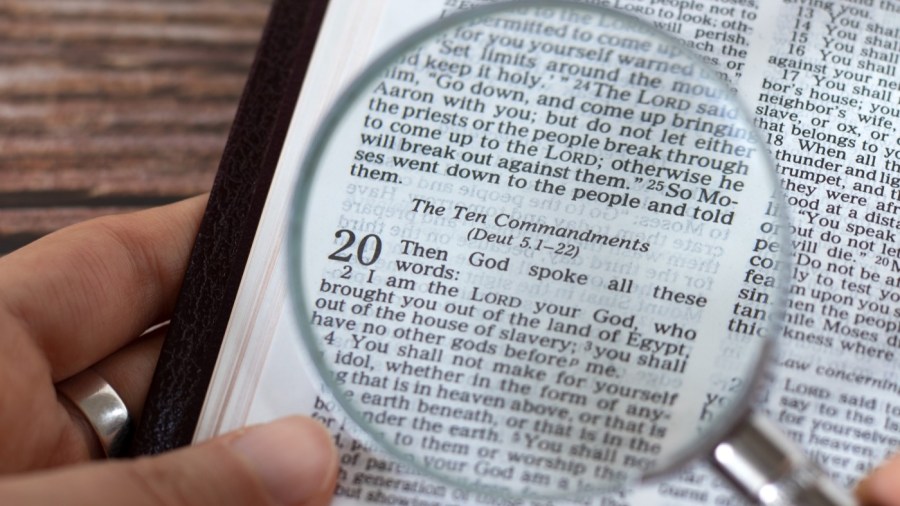Gov. Jeff Landry of Louisiana signed a bill this month requiring the state’s public schools, colleges and universities to display the Ten Commandments in every classroom. Posters must be no smaller than 11 by 14 inches, featuring the Commandments in “large, easily readable font.”
Anticipating a court challenge, State Sen. Jay Morris declared that the purpose of the bill “is not solely religious.” And the text of the legislation deems the Ten Commandments a “foundational document in our state and national government” that was “a permanent part of American public education for almost three centuries.”
This rationale is disingenuous. The law authorizes but does not require displays of the Mayflower Compact, the Declaration of Independence and the Northwest Ordinance of 1787. The Bill of Rights of the U.S. Constitution, which prohibits government sponsored establishments of religion, goes conspicuously unmentioned.
The law’s sponsors, moreover, made little effort to hide their religious motives. In endorsing a law requiring that transgender students be addressed by the pronouns in their birth certificates, Gov. Landry declared, “God gives us our mark.” He deemed legislation allowing public schools to hire chaplains “a great step for expanding faith in public schools.” State Rep. Dodie Horton, sponsor of the bill, isn’t “concerned with an atheist. I’m not concerned with a Muslim.” Claiming, incorrectly, that the Ten Commandments “are the basis of all laws in Louisiana,” Horton wants “children to see what God says is right and what He says is wrong.”
As supporters of this bill know, more than 40 years ago, in Stone v. Graham, the Supreme Court declared that a Kentucky statute nearly identical to theirs violated the Constitution. Posting the Ten Commandments in every classroom, the justices wrote in an unsigned majority opinion, was “plainly religious in nature,” lacked a legitimate “secular legislative purpose” and served no “constitutional educational function.” The state was encouraging students to “read, meditate upon, perhaps to venerate and obey” the Ten Commandments, and perform religious duties including “worshipping God alone, avoiding idolatry, not using the Lord’s name in vain, and observing the Sabbath Day.”
Nor were the Ten Commandments integrated into the school curriculum, the court noted, where they could be appropriately used in studies of history, law, ethics or comparative religion. And using private contributions to finance the posting (which Louisiana has also mandated) was “immaterial,” because the mandate occurred “under the auspices of the legislature.”
Even as Louisiana’s religious zealots place their bets on a Supreme Court that has turned sharply to the right, the opinion in Stone v. Graham seems as compelling in 2024 as it was in 1980.
Taken from the King James Bible, the Ten Commandments’ text required by the legislature differs from the text in Jewish scriptures, and, of course, from precepts central to other religious faiths. The Catechism of the Catholic Church does not include the commandment “Thou shalt not make to thyself any graven images.” The bill, then, might well be interpreted as an endorsement of Protestant theology in a state that has a substantial Catholic population, calling to mind James Madison’s prescient warning: “Who does not see that the same authority which can establish Christianity, in exclusion of all other religions, may establish with the same ease any particular sect of Christians, in exclusion of all other sects?”
About 84 percent of adults in Louisiana identify as Christians. That said, many thousands of state residents (including many Christians) may conclude that this new requirement infringes on their freedom of thought and religious rights. About 2 percent of adults are non-Christians (Jews, Muslims, Hindus); 13 percent are atheists, agnostics or “nothing in particular.” Six percent do not believe in God. Thirty-three percent seldom or never read scripture; 21 percent believe scripture is not the word of God; and only 43 percent look mostly to religion for guidance on what is right and wrong.
Some of these folks, no doubt, will disagree with the claim of Gov. Landry, who is apparently unfamiliar with Hammurabi’s Code, that “if you want to respect the law, you’ve got to start from the original lawgiver, which was Moses.”
Although (or perhaps because) America is growing more diverse — ethnically, racially and religiously — the movement to mandate Ten Commandments’ texts in public school classrooms is growing. Following the passage of this law in Louisiana, Lt. Gov. Dan Patrick (R) of Texas vowed to pass a similar bill in his state. Parallel legislation is likely to become law in several other red states.
And Donald Trump, who has not adhered scrupulously to all Ten Commandments, posted his view on Truth Social in all caps: “I LOVE THE TEN COMMANDMENTS IN PUBLIC SCHOOLS, PRIVATE SCHOOLS AND MANY OTHER PLACES, FOR THAT MATTER… THIS MAY BE, IN FACT, THE FIRST MAJOR STEP IN THE REVIVAL OF RELIGION, WHICH IS DESPERATELY NEEDED IN OUR COUNTRY.”
Have we seen the future? Will it unite or further divide us? Our destiny, as Cassius told Brutus, “is not in our stars but in ourselves.”
Glenn C. Altschuler is the Thomas and Dorothy Litwin Emeritus Professor of American Studies at Cornell University.

